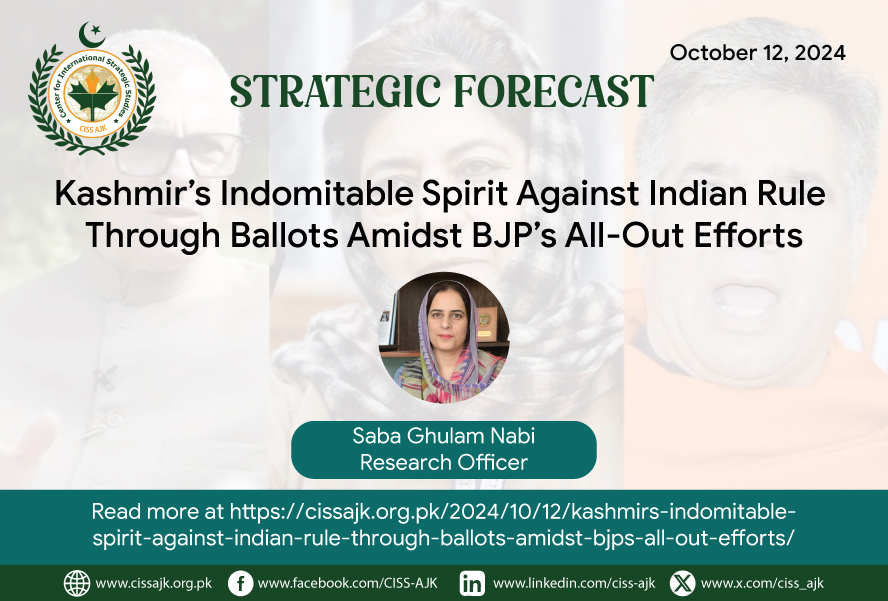The recent assembly elections in Indian-Illegally Occupied Jammu and Kashmir (IIOJK) resulted in a resounding defeat for the Bharatiya Janata Party (BJP), a historic turning point in the region’s violent political history. The party, which has vigorously promoted its agenda in Kashmir, received only 29 out of 90 seats, reflecting the people’s rejection of its perspectives. And it is proved that Kashmiris never miss any opportunity to express hatred against Indian occupation. Meanwhile, the National Conference-Congress alliance won 49 seats, with minor parties and independents taking a portion of the remaining seats. For the Kashmiris, this outcome is more than just a political shift; it is a clear statement of their ongoing resistance to the occupation. None of the tactics of the BJP worked, the gerrymandering, the delimitation, declaring non-natives of the state as natives of the state, or giving the paharris the status of Tribe just to increase its voter bank. But Modi’s dream of having a BJP Chief Minister in Jammu and Kashmir was not fulfilled.
The massive win of the National Conference has once again asserted the dissent of Kashmiris against oppressive Indian rule. One of the most significant aspects of this election was the public’s overwhelming rejection of candidates seen as having ties to New Delhi or the BJP. This rejection highlights the political consciousness of Kashmiris, who are well aware of the forces seeking to alter their demographic and political landscape. This election meant much more to Kashmiris than just choosing a party. It was also about preserving their demographic structure, identity, and autonomy against the constant attempts of the Indian government to alter this region.
The political trajectory of the National Conference has been a subject of considerable interest throughout history. Sheikh Abdullah, the first Prime Minister of Indian Illegally Occupied Jammu and Kashmir (IIOJK) and the founding president of the National Conference, initially embraced India’s so-called secularism over the ‘Two-Nation Theory.’ However, he soon felt disillusioned by the Indian government, as its promises of secularism were never fully realized. This discontent led to the onset of adversarial politics in 1953, despite his party’s uncontested victory in the 1951 elections. Sheikh Abdullah was subsequently dismissed from his position as Prime Minister and imprisoned for 11 years. Although the National Conference continued to function within IIOJK, it is a well-documented fact that the ‘party in power’ in IIOJK held no real power in the face of the Indian government’s authority.
During the decade after the nomenclature of the PM and president changed in IIOJK, the Indian National Congress has been the winning party. In 1970, Sheikh Abdullah once again surrendered before the Indian government and accepted their terms to gain the seat of Chief Minister. With a little strength, the demand for “internal autonomy” by NC remained the slogan. This hard-earned support of the Indian government was short-lived, and soon the politics of IIOJK took a turn into a freedom struggle. In the unfortunate elections of 2014, the Jammu and Kashmir Peoples Democratic Party (PDP) won 28 seats and allied with the BJP, which had won 25 seats from Jammu constituencies. The “unholy alliance” of “South and North”, as PDP president Mufti Muhammad Saeed called it, paved the way for the abrogation of the special status of Jammu and Kashmir. PDP lost its support in public for allying with the BJP.
In these elections, though the NC has won 49 seats, this is not due to their slogans rather because the candidates of the PDP were considered to be very pro-India, so they were rejected. So it’s not the slogan of the National Conference that has gained the support; it’s more hatred for the PDP that has given NC an edge over the PDP. However, the true challenge for the National Conference (NC) lies ahead. Given that the NC has consistently advocated for the restoration of the state’s special status, the public will now expect the party to maintain a resolute position on this issue. With a fragmented mandate, it will be difficult for the NC to both remain attuned to public sentiment and secure concessions from the Indian government. The historical record shows that the anti-India slogans and dissenting narratives are merely tools to win public support IIOJK, parties turn a blind eye to these after coming into power, however, this time it will not be easy for them to do so. If NC wants to survive, it has to ensure that they satiate the demands of the public who not only yearn for restoration of the state’s special status but they believe that this act as stepping in getting fully emancipation from the Indian Occupation by acquiring the right of self-determination.
In this manner, NC has to recognize the dire need to establish principles that will secure Kashmir’s right to self-determination in the future, which the masses in Kashmir want, therefore, the party has to be looking beyond simple politics. From the result of these elections, the international community must also take heed of the results of these elections. The people of Kashmir have made it quite clear that they will not back down from their quest for self-determination and that they oppose India’s illegal occupation.
Author
Saba Ghulam Nabi is Research Officer at Center for International Strategic Studies AJK

